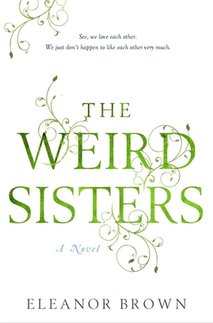
21 Jan 2011 01:32:19
The eldest sister, Rose (Rosalind), never left Barnwell, becoming a math professor at the college. She's engaged to another professor who accepts a teaching position in England, forcing Rose to choose between the life she knows and the life she could have. As the story opens, she cannot make that choice because she's trapped by her own fear and sense of self-importance.
The middle sister, Bianca, known to everyone as "Bean," has just been fired from her job at a New York law firm. That particular scene is rather implausible, but Bean's desire to live well beyond her means, then returning home, humiliated and in debt after failing to make it in New York City, contains much truth. Bean craves attention, preferably from men, and this threatens to prevent her personal growth.
Finally, Cordelia has opted to live a somewhat outdated bohemian gypsy lifestyle, dropping out of college to roam around the country, but when she becomes pregnant, she realizes it is time to settle down, even if she has no idea how to do that.
Their father is a professor of Shakespeare at the college and, more than that, is obsessed with Shakespeare's works. All three sisters are named after Shakespeare heroines — the title of Brown's novel itself comes from "Macbeth." More than that, Professor Andreas communicates with his family almost exclusively via Shakespeare, photocopying pages from the plays and highlighting various passages. It's in this way he informs his daughters of their mother's cancer: "Come, let us go; and pray to all the gods/ For our beloved mother in her pains" (that's from "Titus Andronicus"). It's an eccentric twist on the emotionally distant father type, and though the liberal sprinkling of Shakespeare quotes often strains credibility (and one's patience), Brown makes it work.
"The Weird Sisters" is written in first-person plural, the sisters speaking as a single voice, and it is equal parts clever and heartfelt. As a discourse on sibling dynamics, the book very much succeeds. While each sister's story of self-improvement is fairly predictable (again echoing Shakespeare: all's well that ends well), Brown nails the sentiment conveyed by the book's tag line: "We love each other. We just don't happen to like each other very much."
The middle sister, Bianca, known to everyone as "Bean," has just been fired from her job at a New York law firm. That particular scene is rather implausible, but Bean's desire to live well beyond her means, then returning home, humiliated and in debt after failing to make it in New York City, contains much truth. Bean craves attention, preferably from men, and this threatens to prevent her personal growth.
Finally, Cordelia has opted to live a somewhat outdated bohemian gypsy lifestyle, dropping out of college to roam around the country, but when she becomes pregnant, she realizes it is time to settle down, even if she has no idea how to do that.
Their father is a professor of Shakespeare at the college and, more than that, is obsessed with Shakespeare's works. All three sisters are named after Shakespeare heroines — the title of Brown's novel itself comes from "Macbeth." More than that, Professor Andreas communicates with his family almost exclusively via Shakespeare, photocopying pages from the plays and highlighting various passages. It's in this way he informs his daughters of their mother's cancer: "Come, let us go; and pray to all the gods/ For our beloved mother in her pains" (that's from "Titus Andronicus"). It's an eccentric twist on the emotionally distant father type, and though the liberal sprinkling of Shakespeare quotes often strains credibility (and one's patience), Brown makes it work.
"The Weird Sisters" is written in first-person plural, the sisters speaking as a single voice, and it is equal parts clever and heartfelt. As a discourse on sibling dynamics, the book very much succeeds. While each sister's story of self-improvement is fairly predictable (again echoing Shakespeare: all's well that ends well), Brown nails the sentiment conveyed by the book's tag line: "We love each other. We just don't happen to like each other very much."

